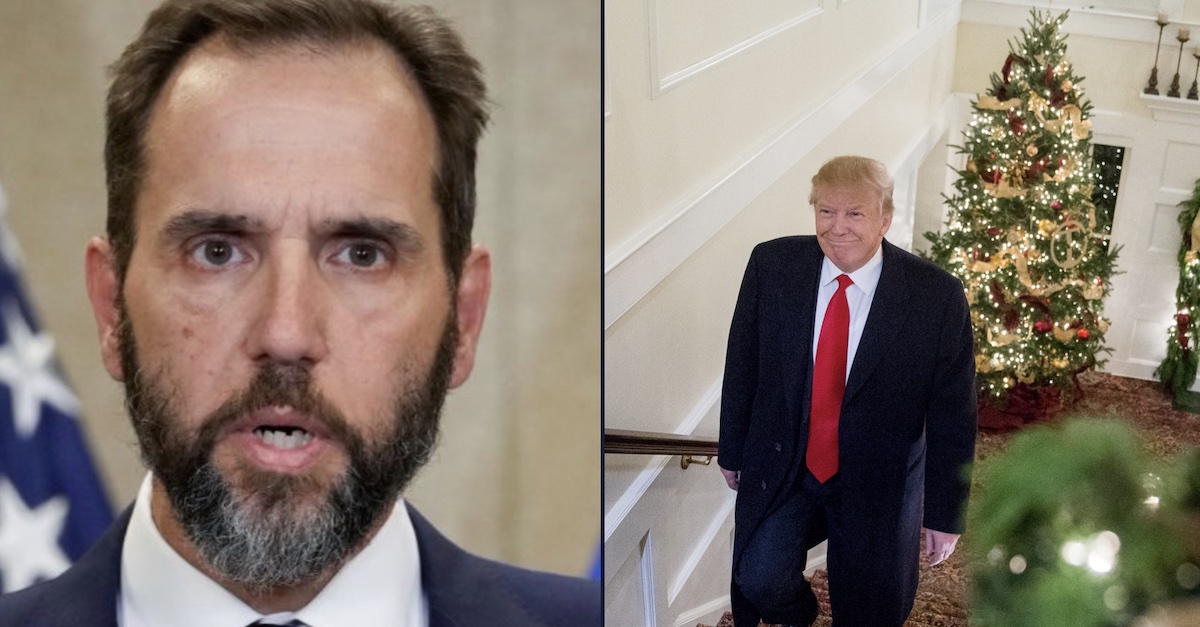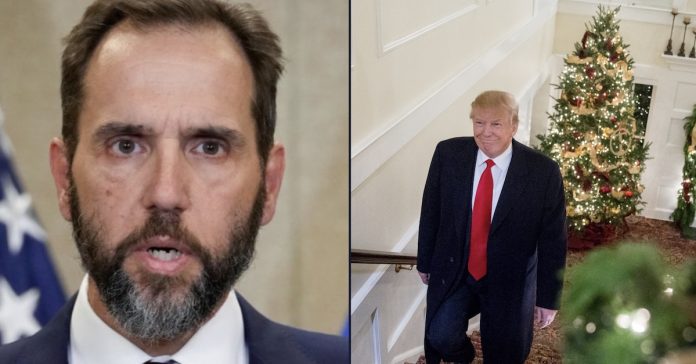
Jack Smith (AP Photo/J. Scott Applewhite), Donald Trump (AP Photo/Andrew Harnik)
After special counsel Jack Smith caught everyone’s attention by asking the U.S. Supreme Court to settle Donald Trump’s presidential immunity claims once and for all, the former president’s lawyers bristled that Smith was not only in a rush but also gunning to ruin Christmas in a “Grinch”-like way.
If the justices do what Smith asks on the fast track, there doesn’t have to be a threat to anybody’s holiday plans. Here’s where things stand from a scheduling standpoint.
What the special counsel asked for and how SCOTUS responded
On Monday, Jack Smith made the “extraordinary request” that the Supreme Court grant a writ of certiorari before judgment, with the goal of having Trump’s claims of “absolute immunity” from Jan. 6 prosecution decided by the justices and removing any need for proceedings in the U.S. Court of Appeals for the D.C. Circuit.
Asking the justices to grant the rare writ of cert before judgment, Smith said the Trump prosecution “is an extraordinary case” similar to the 1974 Watergate-era case United States v. Nixon, where SCOTUS granted such a writ and ushered in the beginning of the end of Richard Nixon’s presidency.
The special counsel insisted that Trump’s immunity claims be resolved quickly so that the Jan. 6 trial, currently scheduled March 4, can “proceed as promptly as possible if his claim of immunity is rejected.”
In his petition, Smith told the justices that in case they didn’t grant his request, he was “concurrently filing a motion to expedite proceedings in the D.C. Circuit.”
Later on Monday, SCOTUS (without actually granting the writ of cert before judgment), agreed to expedite its consideration of Smith’s petition, ordering Trump to respond by 4 p.m. on Dec. 20.
That brings us to the Trump team’s resulting complaint about “Grinch”-like activity in the D.C. Circuit.
How Jack Smith tried to steal Christmas, according to Trump lawyers
On Wednesday, the former president’s lawyers pleaded with the D.C. Circuit not to operate on Jack Smith’s “rushed schedule” or else defense counsel’s holiday hopes might be dashed. Trump attorneys then compared Smith to Dr. Suess’ “Grinch” character — that is, someone scheming on how to ruin everyone’s holiday by making Trump file a brief the day after Christmas:
Even if the Court grants expedited consideration — which it should not do — it should not adopt the prosecution’s proposed schedule, which is facially unreasonable. The prosecution “requests that the Court require the defendant’s opening brief be due no later than ten days from the entry of a briefing order,” Mot. 5-6 — which, assuming the Court rules promptly on the motion to expedite after the close of briefing, would make President Trump’s opening brief due the day after Christmas. This proposed schedule would require attorneys and support staff to work round-the-clock through the holidays, inevitably disrupting family and travel plans. It is as if the Special Counsel “growled, with his Grinch fingers nervously drumming, ‘I must find some way to keep Christmas from coming. … But how?”” DR. SEUSS, HOW THE GRINCH STOLE CHRISTMAS (Random House 1957).
Later on in the day, Smith shot back that “[n]one of the arguments” raised in “opposition to the Government’s motion to expedite this case has merit” — including the concerns about holiday plans.
The special counsel pointed out that if the D.C. Circuit acted quickly then the “defendant’s brief would be due no later than December 23,” i.e., one day before Christmas Eve.
Regardless, Smith said, “the public’s need for a speedy resolution of these important legal issues take precedence over personal scheduling issues.”
How the D.C. Circuit responded and what SCOTUS may do
Acting as swiftly as the special counsel suggested on Wednesday, a three-judge panel including U.S. Circuit Judges Karen L. Henderson, J. Michelle Childs, and Florence Pan — appointed by Presidents George H.W. Bush, Joe Biden and Biden, respectively — agreed to expedite the appeal and ordered up a Trump brief for Dec. 23, a Smith brief on Dec. 30, and a Trump reply on Jan 2, 2024.
As MSNBC legal analyst Lisa Rubin pointed out, however, SCOTUS will be receiving Trump’s response to Smith, at the latest, on the afternoon of Dec. 20 — and the high court, already having granted expedited consideration, could quickly grant a writ of certiorari before judgment ahead of the D.C. Circuit-scheduled Dec. 23 deadline for Trump’s brief, rendering the D.C. Circuit proceedings supremely leapfrogged and clearing the holiday calendar.
This means that if SCOTUS wants to, it has three days to save their lower court colleagues’ holidays by granting or denying the cert petition on or before 12/23. 2/
— Lisa Rubin (@lawofruby) December 13, 2023
After all, it only took SCOTUS one week to grant a writ of certiorari before judgment in U.S. v. Nixon.
“On May 24, 1974, the Special Prosecutor sought certiorari before judgment following the district court’s denial of former President Nixon’s motion to quash a subpoena seeking Oval Office recordings,” as Jack Smith wrote in his petition to SCOTUS. “The Court granted certiorari a week later and set the case for argument on July 8, 1974. Id. at 690. The decision issued 16 days later, and trial began in the fall of 1974.”
Have a tip we should know? [email protected]

